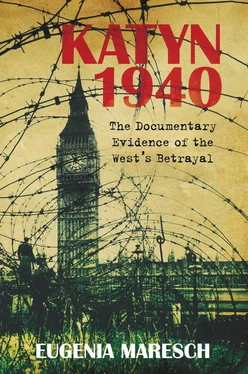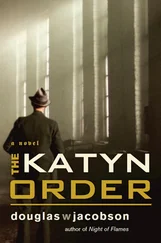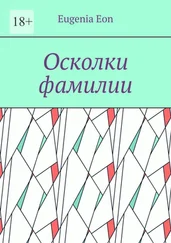I am frankly terribly worried about this Russo-Polish business. I see innumerable snags ahead. I won’t mention Polish BBC gaffs because they are too blatantly deplorable to merit further attention except that they MUST be stopped.
We are going to find ourselves being pulled in as mediators in a situation which holds promise of developing in the most awkward way. I only hope the business won’t sow a lot of discord.
What is going to happen when the Poles find out the number of Poles who have been ‘lost’ since 1939 is clearly an awkward one to answer. What will the British Press want to say when they find out? We’ve got to keep out of the affair as much as we can, and when we do intervene we must remember that Russia can help us to beat Hitler, and not Poland . [9] TNA WO 32 /15548, a self-typed report by Lt Gen Mason MacFarlane, head of 30 Military Mission in Moscow, dated 7 August 1941.
[Author’s italics]
Mason MacFarlane also advised the FO that Captain Józef Czapski, [10] Józef Czapski (1896–1993) Cavalry Captain in reserve, 8 Lancers Division, born and raised in Moscow of aristocratic family, accomplished painter who studied in Paris, survivor of Starobelsk camp. After the war published among other pieces Wspomnienia Starobielskie (Starobelsk reminiscences) Rome 1945 and Na nieludzkiej ziemi (Inhuman Land) Paris 1949.
a plenipotentiary to General Anders, had raised the question of the missing officers during his first meeting with the NKVD. He was kept in the corridor for five hours and sent home with nothing. MacFarlane advised Czapski to deal directly with Vsevolod Merkulov, [11] Vselevod Nikolaevich Merkulov (1895–1953). Soviet Security official, aide to Beria specialising in cruel interrogation, member of Troika appointed 5 March 1940, to exterminate the Polish officers. In charge of ‘clearing out’ the three camps. Arrested with Beria and executed in 1953. Named with Beria in 1990 as responsible for murdering the Polish PoWs in 1940.
Deputy Commissar to Beria involved with PoWs, or alternatively, to go through General Georgy S. Zhukov, Chief of the NKVD , who was in charge of the affairs of the Polish Army in Russia and was on good terms with Anders. Mason MacFarlane despatched a ‘Most Secret/Private/Most Immediate’ cipher to the War Office, telling them that the Polish goverment were anxious to invite Zhukov to London for discussions. ‘Zhukov is a very big noise, second only to Beria, a prominent figure in Russian secret organisations and has Stalin’s ear.’ [12] TNA HS 4 /243 Most Secret cipher telegram sent from No. 30 Military Mission in Moscow to the War Office DMI, MIL 681, 8 September 1941.
MacFarlane was sympathetic towards Czapski and invited him to the British Embassy to write up his report, which he eventually submitted to the Russians and gave a copy to Mason MacFarlane, who in turn sent it to the War Office and Foreign Office. Frank Roberts, First Secretary of the Central Department of the FO [13] Frank Kenyon Roberts (1907–1998), started his diplomatic career as Third Secretary in the FO in 1930, served in Paris 1932, Cairo 1935, transferred to the FO in 1937; First Secretary in 1940, acted as Chargé d’ Affaires in Czechoslovakia; war years in FO as Head of Central Department, Chargé d’ Affaires in Moscow 1945–7; Principle Private Secretary, Assistant Under Secretary of State in 1949; High Commissioner for India in 1951, Deputy Under Secretary of State German Affairs; Ambassador in Moscow 1960–2 and Bonn 1963–8. Knighted. Dealing with Dictators , autobiography published 1991.
made a cryptic remark that the whole affair was very odd and underlined Polish suspicions of the Soviet government. [14] TNA FO 371/31083 C 4529/19/55. Translation of Captain Józef Czapski’s memorandum on missing Polish officers dated 2 II 1942. Mr H. Lacy Baggallay, acting Counsellor, British Embassy, who despatched the report to Anthony Eden at the FO, questioned the number of the missing men, believing that a far greater number of Polish prisoners of war had been sent to the extreme north-east of Siberia than originally suggested by Czapski in his 2 February report.
The SOE had a desk officer in Moscow who reported regularly to London on the predicament of the Poles in the Soviet Union. The first report, which SOE received from the Poles dated 1 November 1941, came from Buzuluk USSR, one of several centres where soldiers flocked in anticipation of joining the Polish army; others were at Tatischev, Totskoe and Kuibyshev. In accordance with the 1941 Soviet-Polish agreement, they were being released from prisons and forced labour camps scattered throughout the vast Soviet empire. The report by Lieutenant Bronisław Młynarski [15] TNA HS 4/199 report to GOC (General Officer Commanding) Polish Army in Buzuluk Soviet Russia 1 November 1941, by Lt Bronisław Młynarski (1899–1971) Lieutenant, adjutant to Senior Officers in Starobelsk camp: Major S. Zaleski, Major K. Niewiarowski and Major L. Chrystowski successively. The report deals with missing Polish officers from PoW camps, especially Starobelsk, where he was interned from 30 IX 1939 to 12 V 1940. Part of Młynarski’s report was incorporated in ‘Facts and Documents’ compiled in 1946, p 64. After the war settled in America, where he wrote his memoirs W niewoli sowieckiej (In Soviet Captivity), Gryf publication London 1974.
was intended for the Polish government-in-exile based in London. A copy was sent to Professor Stanisław Kot, [16] Professor Stanisław Kot (1885–1975) History Professor at Jagiellonian University, politician, in 1941–2 Polish Ambassador in Moscow. After the war, at odds with the Polish Government-in-exile, a forlorn figure, died in London. Published Listy z Rosji do Gen. Sikorskiego (Letters from Russia to General Sikorski) London 1956.
the Polish Ambassador to the USSR (1941–1942) who was temporarily in Kuibyshev, after being evacuated from Moscow with the Diplomatic corps.
Kot had set up an agency, the function of which was to gather information on Poles who were still in Soviet detention. It was staffed by a group of officers recently released, among them Professor Wiktor Sukiennicki. [17] Wiktor Sukiennicki (1901–1983) Professor of Law at the University of Stefan Batory in pre-war Wilno, Lieutenant in reserves, deported by the Soviets to Siberia, joined the Polish Army in USSR, called upon by Ambassador Kot to set up an Agency to record the whereabouts of the Polish prisoners from depositions made by those who survived; Author of many publications, the relevant one is Wspomnienia i Relacje (Reminiscences and Statements) published in Zeszyty Historyczne, 1982.
Armed with their testimony, Kot would intervene with the Soviet authorities, sometimes not directly informing Anders, who acted similarly. This caused a great deal of friction between them as both claimed primacy of responsibility for the missing. Within the newly formed Polish army in the USSR, Anders had set up Biuro Dokumentów run by Lt Adam Telmany and Lt Gen Kazimierz Ryziński, which was moved to Jerusalem and in 1944 to Rome. By then it was reorganised and renamed Biuro Studiów (Research Bureau) headed by historian Zdzisław Stahl. [18] Zdzisław Stahl (1891–1987) economist, journalist and politician, 1930–1935 and again in 1938 member of the Polish Sejm (Parliament) representing National Party. Arrested and deported to GUL ag by the NKVD , in 1941 joined the Polish Army, engaged as Head of Biuro Studiów of 2 Corps, working on Katyn papers.
After leaving his post as Ambassador to Russia, Kot became the Minister of State for the Middle East and was in charge of Centrum Informacji of the Ministry of Information and Documentation, which continued to collate information gathered by Biuro Dokumentów.
Читать дальше












